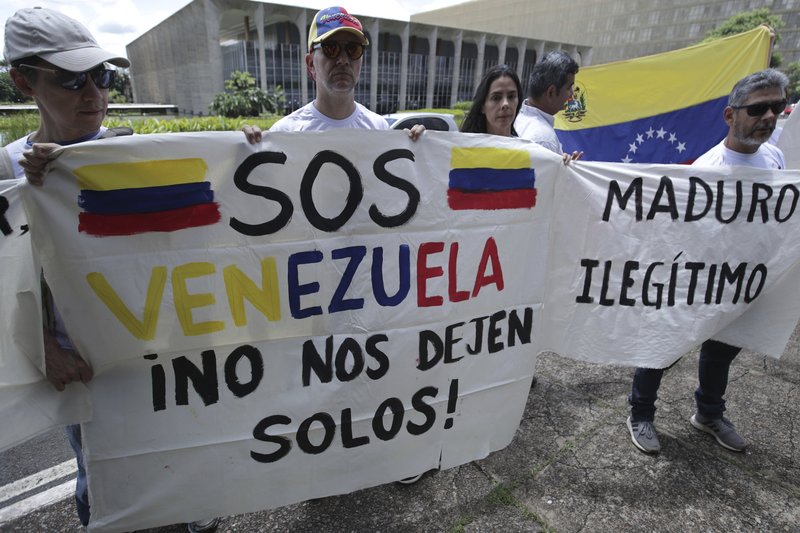CARACAS, Venezuela -- Venezuelan President Nicolas Maduro was sworn in to a second term Thursday as international calls arose for him to step down and a devastating economic crisis persists.
Seventeen Latin American governments, the United States and Canada rejected the legitimacy of Maduro's next term in a measure adopted Thursday. Most countries from Europe and Latin America didn't send representatives to the swearing-in.
But Cuban President Miguel Diaz-Canel, Bolivian President Evo Morales and President Anatoli Bibilov of a breakaway province of Georgia were among the few foreign leaders who attended the ceremony at the country's Supreme Court.
In a speech after his swearing-in, Maduro claimed 94 countries had sent representatives to his inauguration. He vowed to continue the legacy of the late President Hugo Chavez and accused the United States of trying to ignite unrest through its increasing economic sanctions.
"Venezuela is the center of a world war led by the North American imperialists and its allies," said Maduro, a former bus driver. "They have tried to convert a normal inauguration into a world war."
Maduro's second term extends Venezuela's socialist revolution during widespread complaints that he has stripped the country of its last vestiges of democracy. Maduro, 56, denies that he's a dictator.
The Organization of American States voted not to recognize Maduro's legitimacy, adopting a resolution Thursday presented by Colombia, Argentina, Brazil, Chile, Costa Rica, the United States, Paraguay and Peru. The move was denounced by Venezuela's ambassador to the organization, Samuel Moncada, as "a hostile act ... against the will of our nation."
Paraguay went a step further, cutting diplomatic ties. U.S. Secretary of State Mike Pompeo said in a statement that the United States will keep up pressure in support of the Venezuelan people.
"It is time for Venezuelan leaders to make a choice," Pompeo said, urging Maduro supporters to be on the right side of history. "Now is the time to convince the Maduro dictatorship that the moment has arrived for democracy to return to Venezuela."
Oil-rich Venezuela was once among Latin America's wealthiest nations. It produced 3.5 million barrels of crude daily when Chavez took power. Output now has plummeted to less than a third of that. Critics blame years of rampant corruption and mismanagement of the state-run oil company PDVSA.
An estimated 2.3 million Venezuelans have fled their nation's hyperinflation, food and medical shortages over the past two years, according to the United Nations. Those remaining live on a monthly minimum wage equating to less than $5 and falling daily.
The opposition-led Congress opened its session for the year this week, led by 35-year-old Juan Guaido, who vowed to battle against Maduro. Guaido said Maduro is "usurping the presidency."
While Maduro's popularity has plunged amid scarcities, hyperinflation and rising authoritarianism that have sparked a mass emigration, supporters who receive government subsidies in shantytowns continue to back the man who took over from Chavez.
"It's not the president's fault," said Frances Velazquez, a 43-year-old mother of two who survives on government-subsidized boxes of rice, flour and cooking oil. Velazquez blamed opportunists who drive up the prices of scarce items for making life difficult for families like hers.
Others, like 52-year-old construction worker Ramon Bermudez, have lost hope of escaping Maduro's rule.
He pointed out the irony of living in a nation with the world's most abundant oil reserves yet having to wait in line overnight to fill three canisters of natural gas to cook at home.
"All that's left to do is raise your hand to heaven and ask God to help us," said Bermudez, camped out on a Caracas sidewalk with hundreds of others waiting for gas. "There's nothing more."
A Section on 01/11/2019
